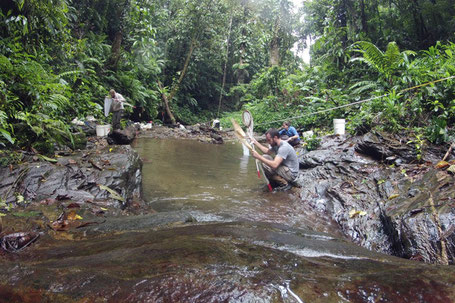We have three ocelots at the centre, none of whom can be released into the wild, but they do breed in captivity so any young that can be successfully raised, we try to re-introduce back into the rainforest here. The wild population of these beautiful cats currently stands at around 150 on Trinidad. They have been completely wiped out on Tobago.
Wildlife Conservation
Trinidad & Tobago is one of the most bio-diverse places on our planet. At ECWC it's our mission to conserve the wildlife and it's habitat both for it's own sake and for future generations to enjoy. In addition to education and rehabilitation, one of our conservation initiatives is the propagation of native species for release into appropriate, protected areas of the wild in order to ensure survival of threatened and endangered species, as well as to boost populations of species currently in decline. Our success with the breeding (and releasing where appropriate) of birds, snakes, iguanas, agouti, opossum and semi-aquatic turtles began in 2009 and continues today.
Check out some of the animals you may find here in Trindad & Tobago in our wildlife guide.
An Often Overlooked Biodiversity Hotspot

Trinidad & Tobago may be a small island nation but it plays a huge role in our understanding of tropical ecology, being home to to over 3,000 species and counting, including 85 endemic species, in an area of just 2,000 square miles. We have 470 species of birds where there are only 270 species in the whole of the rest of the Caribbean.
These islands are of particular importance because they are close to, yet separate from South America, and biologists are observing that evolution is happening here on a rapid and unique scale, so it's doubly important that we preserve our natural heritage here on the islands.
Biologists studying wildlife in stream habitat. (photo: Nigel Noriega)
Threats to our Wildlife
There are 3 main factors that are causing great and increasing threat to the wildlife here in Trinidad & Tobago:

Bush Meat
Poaching is a huge problem in Trinidad & Tobago. Sadly many people here still cling to the belief that bush meat is a healthy, sustainable option. It's not. Many wild animals carry parasites and disease. As a result of poaching our forests and oceans are being stripped of wildlife.

Habitat Loss
Destruction of forest and reef systems on the islands mean that native wildlife has an ever shrinking home and as a result their numbers fall, but it can also have repercussions for the human population such as drought, flash floods and depletion of natural resources.

Pet Trade
The trade in 'exotic' animals has a devastating effect on ecosystems all over the world. Entire family groups are killed to obtain one baby, and pet owners often have no idea how to care for these wild animals resulting in trauma, sickness and disease in the animal and possible injury to the owner.

